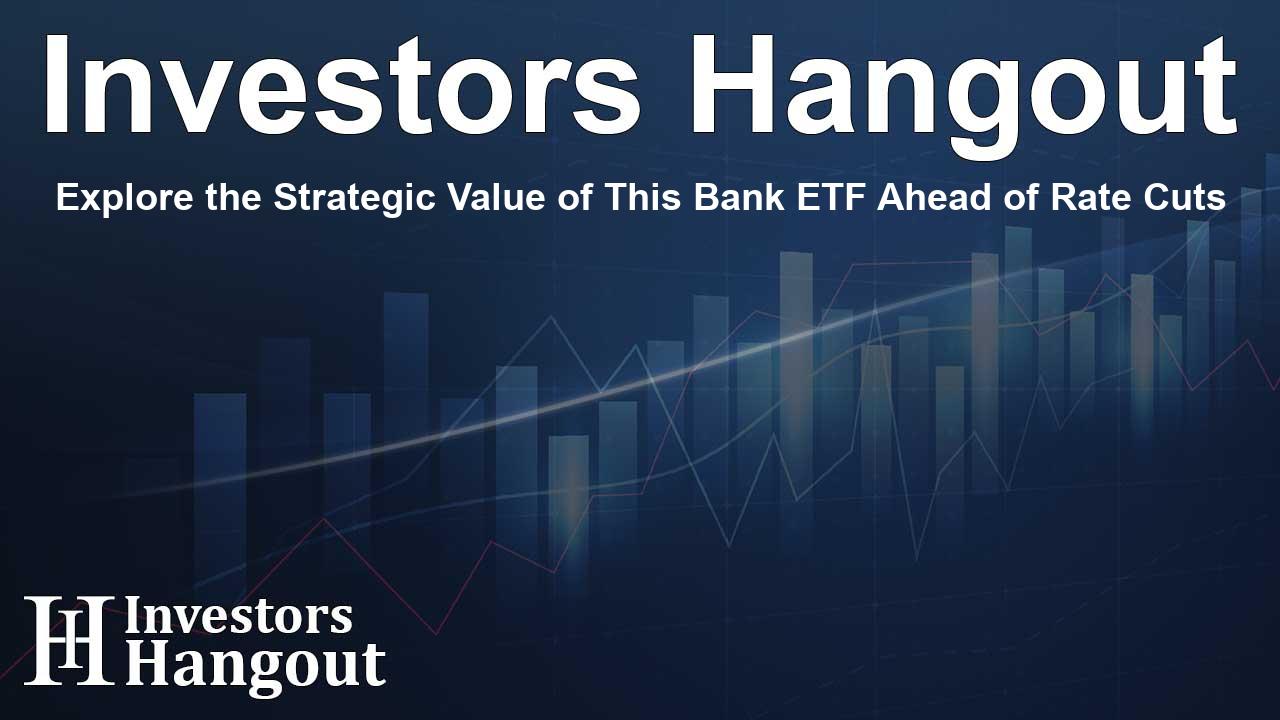Explore the Strategic Value of This Bank ETF Ahead of Rate Cuts

Anticipating the Fed's Rate Decisions
The recent meeting of the Federal Reserve indicated stability in the benchmark effective federal funds rate (EFFR), remaining in the 4.25% to 4.50% range. Chairman Jerome Powell expressed uncertainty about the economic outlook, which some market analysts perceived as a signal for potential changes in monetary policy down the line.
Despite no changes, the financial sector experienced a decline following the announcement, a reaction that was somewhat expected by economists. The Financial Select Sector SPDR Fund saw a notable drop, yet managed to recover some losses, illustrating the resilience the financial sector has shown over recent times.
This year, the financial sector has shown impressive growth, outperforming major indices like the S&P 500, driven by various factors including strong performances from individual banks. With increasing interest rates and economic activity, investment firms and banks appear to be on a path toward favorable returns.
For investors seeking opportunities before the next Federal Reserve meeting and an anticipated rate cut, the Invesco KBW Bank ETF presents a compelling option for portfolio diversification.
Upcoming Indicators and the Fed’s Strategy
The Federal Reserve’s next meeting is set for September, though there is an upcoming symposium that will focus on economic indicators like inflation and employment. During this atmosphere, market watchers will be keenly observing to gauge the Fed's approach towards interest rates.
With predictions suggesting a high probability for a rate cut by this September, and even more so for the October meeting, investors are gearing up for shifts in the financial sector. Analysts indicate that barring any unforeseen economic downturns, the Fed may ease rates, allowing for more flexibility in investment and lending.
A lowering of interest rates typically instigates increased borrowing, encouraging consumers and businesses to take on loans that can stimulate economic growth. This dynamic could lead to a more favorable investment climate, particularly within the financial sector.
The Strong Performance of the Invesco KBW Bank ETF
The performance of bank stocks this year has been notable, with major institutions such as Bank of America and JPMorgan Chase seeing significant gains. The Invesco KBW Bank ETF, which includes these companies, has outperformed not just its benchmark but also the broader financial sector.
Banking giants form a substantial part of the KBWB portfolio, and their successful gains reflect the ETF's overall performance dynamics. This makes the ETF an attractive option for those looking to invest in the financial sector.
Shifting Perspectives: Institutional Trends and Future Outlook
Over the past year, the Invesco KBW Bank ETF has seen substantial institutional investment, signaling confidence among large investors. This increased interest enhances the outlook for this ETF as it faces decreasing short interest and growing institutional inflows.
As institutional buyers continue to show strong support, it indicates an underlying belief in the ETF’s potential resilience and performance moving forward. Investors would do well to consider such metrics when evaluating their investment strategies.
Preparing for Potential Rate Changes
The Invesco KBW Bank ETF may be a significant player for those anticipating a shift in interest rates. With a competitive expense ratio and dividend yield, it's poised as a strategic vehicle in the financial sector. The investment landscape suggests a favorable outlook, particularly for bank stocks in the event of a Fed interest rate cut.
Investors should stay aware of key data points such as inflation trends and employment statistics, which can influence Fed decisions. Keeping an eye on these indicators and understanding their implications can provide invaluable insights into future market dynamics.
Frequently Asked Questions
What is the Invesco KBW Bank ETF?
The Invesco KBW Bank ETF is an exchange-traded fund that focuses on investing in the largest financial institutions in the United States, designed to reflect the performance of the banking sector.
How does the Federal Reserve influence bank stocks?
The Federal Reserve's decisions on interest rates can significantly impact bank profitability and lending capacities, thus influencing the performance of bank stocks and sectors tied to financial institutions.
Why are institutional investments important?
Institutional investments are vital as they often indicate confidence from major financial players in the future of a particular asset, providing insights into market trends and potential performance.
When is the next Fed meeting scheduled?
The next Federal Reserve meeting is scheduled to convene in September, where decisions regarding interest rates will be discussed based on prevailing economic conditions.
What are the risks of investing in bank ETFs?
Investing in bank ETFs carries risks associated with economic cycles, regulatory developments, and specific sector vulnerabilities that can impact financial institutions' performance.
About The Author
Contact Owen Jenkins privately here. Or send an email with ATTN: Owen Jenkins as the subject to contact@investorshangout.com.
About Investors Hangout
Investors Hangout is a leading online stock forum for financial discussion and learning, offering a wide range of free tools and resources. It draws in traders of all levels, who exchange market knowledge, investigate trading tactics, and keep an eye on industry developments in real time. Featuring financial articles, stock message boards, quotes, charts, company profiles, and live news updates. Through cooperative learning and a wealth of informational resources, it helps users from novices creating their first portfolios to experts honing their techniques. Join Investors Hangout today: https://investorshangout.com/
The content of this article is based on factual, publicly available information and does not represent legal, financial, or investment advice. Investors Hangout does not offer financial advice, and the author is not a licensed financial advisor. Consult a qualified advisor before making any financial or investment decisions based on this article. This article should not be considered advice to purchase, sell, or hold any securities or other investments. If any of the material provided here is inaccurate, please contact us for corrections.
